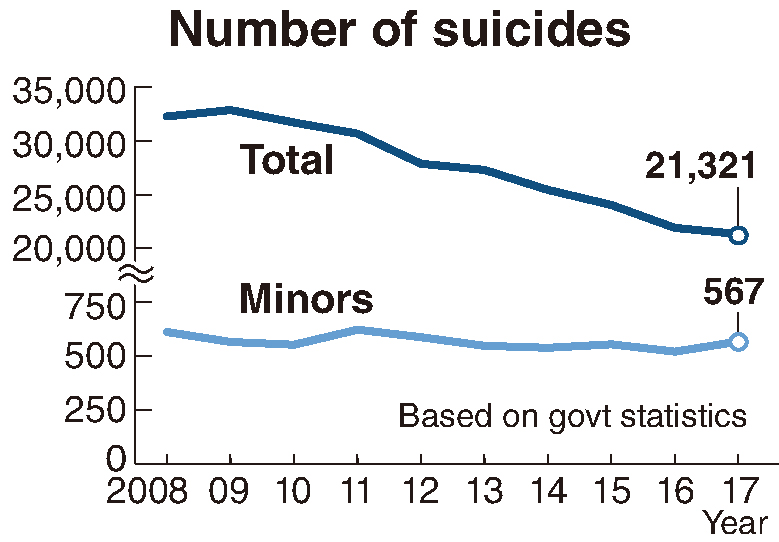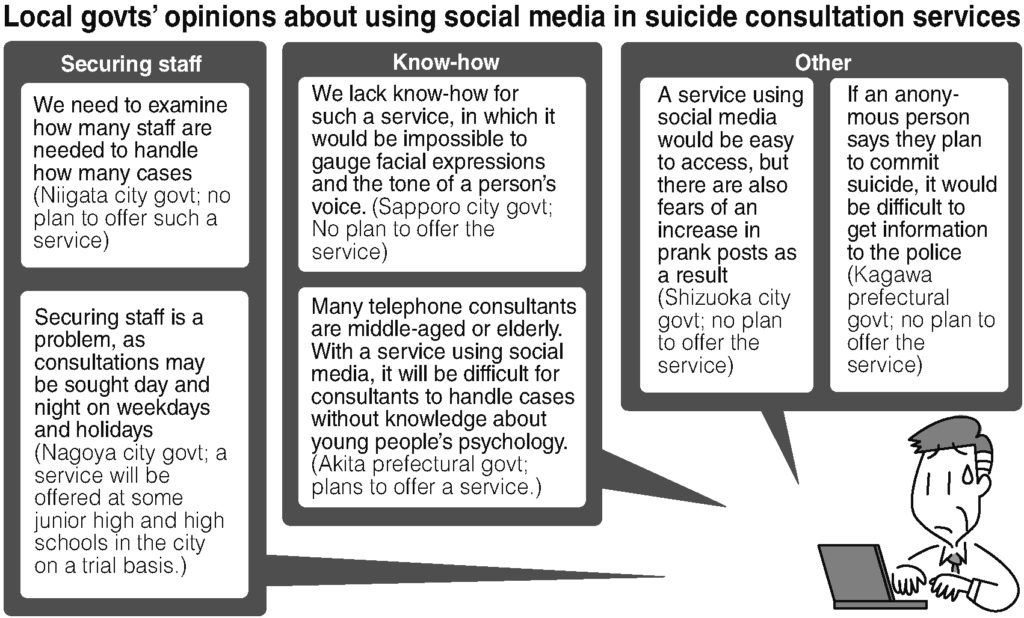Social media eyed to stop suicides in Japan
TOKYO — Thirty percent of prefectures, ordinance-designated cities and prefectural capitals are using or plan to use from this fiscal year or later social media to counsel young people and others who are contemplating suicide, a Yomiuri Shimbun survey has found.
In response to the murder of nine people in Zama, Kanagawa Prefecture, municipalities are rapidly expanding their use of social media, which is widely used by young people. However, many municipalities say they lack the know-how or personnel to carry out such programs.
Article continues after this advertisementIn October, the bodies of nine people were discovered in an apartment in Zama. The Metropolitan Police Department has arrested Takahiro Shiraishi, 27, on suspicion of carrying out the murders and other crimes. He is currently in confinement for expert evaluation.
Shiraishi is said to have used Twitter to contact female high school students and other victims who had posted about suicide. The Yomiuri survey was conducted in April on 98 prefectures, ordinance-designated cities and prefectural capitals, as well as boards of education.
Answers were received from all the local governments. Social media consultations are conducted either through the communication app LINE or services such as Twitter and Facebook, or by using an app that can receive consultations and notifications.
Article continues after this advertisementThe responses showed that 31 local governments — 22 prefectures and nine cities — are planning this kind of program. At least 22 of them had decided to make it available after summer vacation this year in August and September, when student suicides are thought to be more common.
Only five local governments — Tokyo, Nagano and Okayama prefectures and the cities of Aomori and Otsu — have had such programs since last fiscal year, indicating there will be significant growth this fiscal year.
Consultations over social media could help to connect people to in-person or telephone aid provided by local administrative entities and schools, meaning that programs run by local municipalities could be highly beneficial.
Yet 67 municipalities said they had “no plans” to launch such programs. Many cited particular issues with social media that differ from conventional consultation methods.
“It’s difficult to understand the facial expressions and tone of voice of the person seeking a consultation, and it can be hard to provide timely responses,” a Fukuoka city government official said. “We need to find personnel who have knowledge about the way children write and are familiar with popular words,” a Fukui city government official said.
While government statistics show that suicides have been declining nationwide, minors are the only age group that have not shown a decrease. Last year, 567 children committed suicide, up 47 from the previous year.
After the incident in Zama, the government in December began improving its social media consultations, and in March a private organization contracted by the Health, Welfare and Labor Ministry launched a consultation program.
“Creating avenues for young people to use the social media tools they are familiar with for consultations deserves a certain amount of praise,” said Hajime Sueki, an associate professor of psychology at Wako University who is an expert on suicide and social media issue.
“However, many municipalities are holding back out of fear of being criticized should a person who consulted with them end up committing suicide. To continuously provide anti-suicide measures, it’s important to improve knowledge and secure personnel through trial and error.”
Internet giants take concrete actions As suicide is the leading cause of death among young people in Japan, social media and search engine operators are taking measures to help prevent users from taking their own lives.
According to government statistics, the annual number of suicides in the country topped 30,000 for 14 straight years from 1998. However, the figure has declined every year since 2010, with 21,321 people committing suicide last year.
Yet in spite of the chronically low birthrate, 567 minors killed themselves in 2017, a number exceeding the 2010 total.
Accidents are the leading cause of death among people aged 15 to 34 in the United States and European countries, but suicide is the leading cause for the same age bracket in Japan.
Last year, Facebook Inc. began displaying a message inquiring “Can we help?” when users inputted search terms including such words as “suicide” on its social network.
The social media giant previously launched a system in June 2016 through which users could report posts that prompted concern for a user’s safety.
In such cases, Facebook would display the message “Someone on Facebook is worried about you,” with the phone number for a consultation service the next time the user logs in to the site.
Meanwhile, Twitter Inc. freezes users’ accounts if their posts are deemed to encourage suicide. In January, the company started displaying a message advising users to seek help if their search terms included words related to suicide.
Major search engine firms Yahoo Japan Corp. and Google Inc. display the phone number for a consultation service if users perform searches that include such phrases as “I want to die.”
Yahoo said it improves its search engine to identify more keywords hinting at suicide on an ad hoc basis.
If you or someone you know is in need of assistance, please reach out to the National Center for Mental Health (NCMH). Their crisis hotlines are available at 1553 (Luzon-wide landline toll-free), 0917-899-USAP (8727), 0966-351-4518, and 0908-639-2672. For more information, visit their website: (https://doh.gov.ph/NCMH-Crisis-Hotline)
Alternatively, you can contact Hopeline PH at the following numbers: 0917-5584673, 0918-8734673, 88044673. Additional resources are available at ngf-mindstrong.org, or connect with them on Facebook at Hopeline PH.

